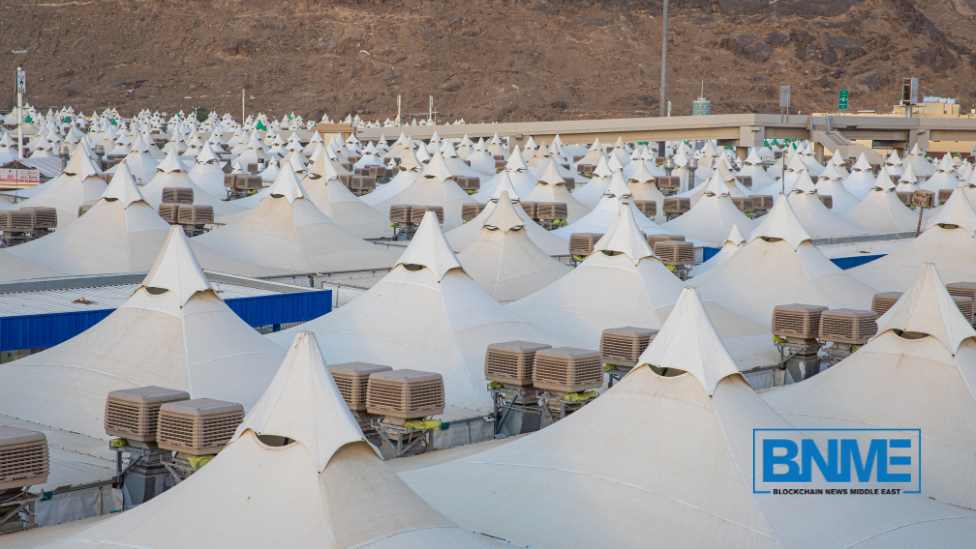Hajj is a sacred obligation where Muslims go on a pilgrimage to Mecca, Saudi Arabia. Adult Muslims have to take this at least once in their lifetime. However, it is mandatory only for those with the financial means and physical capability to undertake the journey and support their families during their absence. Hajj happens for five days. Nonetheless, foreign pilgrims often extend their stay in KSA to four to six weeks due to limited transportation options.
The Vision 2030 on Hajj
Saudi Arabia’s government has been embracing technology and digitization for Hajj, in line with its Vision 2030. It aims to increase the number of Umrah pilgrims to 30 million by 2030 while projecting five million Hajj pilgrims by 2030. The government meeting this goal means that it needs to use technology for all the Hajj processes.
Recently, the Ministries of Hajj and Umrah announced plans to digitize the entire administration process for Hajj and Umrah. Before then, Augmate and Salam Technologies partnered to deliver services for Hajj and Umrah based on Blockchain, distributed ledger, and IoT technologies. While the partnership agreement outlines this intention, further details regarding the implementation process are yet to be disclosed.
What does Blockchain Brings to Hajj?
Blockchain technology has a lot of potential to help all parties involved in Hajj. We will look at some of the benefits of blockchain to Hajj.
Transparent and Secure Transactions
Blockchain technology can help process transparent and secure transactions for Hajj-related payments. Some of these payments include accommodation bookings, transportation, and purchases. In the long run, it reduces the risk of all parties involved to be vulnerable to fraud and corruption.
Immutable Records
Blockchain’s immutable ledger can store critical information about pilgrims. This information ranges from their identities, medical records, to travel history. Blockchain helps relevant authorities to securely access this information, reducing duplication of effort and enhancing security.
Delivery Management
Blockchain can track the distribution of goods and services used for Hajj supply chain. This helps to ensure that all necessary items are available and delivered on time. This can help prevent shortages and ensure the smooth flow of resources during the pilgrimage.
Smart Contracts
Blockchain’s smart contracts can automate various processes of Hajj management, such as ticketing, accommodation bookings, and transportation arrangements. This can make the whole process easier, reduce administrative overhead. Additionally, it helps minimize the risk of errors.
Identity Verification
Blockchain-based identity verification systems can help authenticate pilgrims and ensure that only authorized individuals participate in the Hajj. This can enhance security and reduce the risk of overcrowding at holy sites.
Data Privacy
Blockchain provides a secure and decentralized platform for storing sensitive personal data, ensuring that pilgrims’ privacy rights are protected throughout the Hajj process.
Disaster Management
If there are emergencies or disasters, blockchain can facilitate real-time communication and coordination among relevant authorities. This helps the authorities to respond more effectively and minimize the effect on pilgrims.
Final Words
Going on Hajj is very important to muslims. Every year Saudi Arabia welcomes millions of muslims from different countries. The Saudi Arabia government can use blockchain technology to manage all Hajj related activities and processes.
Frequently Asked Question
Does Saudi Arabia use Blockchain?
Yes, Saudi Arabia uses blockchain technology.
How does Blockchain help Data Management in Saudi Arabia?
Blockchain technology provides a digital, distributed, and transparent ledger for data management.
How does Saudi Arabia manage Hajj?
The Ministry of Hajj is in charge of Hajj management.
How much does Hajj cost per person?
It costs about $3000-$10,000.
Where does the money from Hajj go?
The money from Hajj goes to the government and businesses.
Who makes money from Hajj?
Businesses such as restaurants, travel agents, and airlines make money from Hajj.
Who is exempt from Hajj?
Children, the weak, sick and elderly are exempted from Hajj.




























